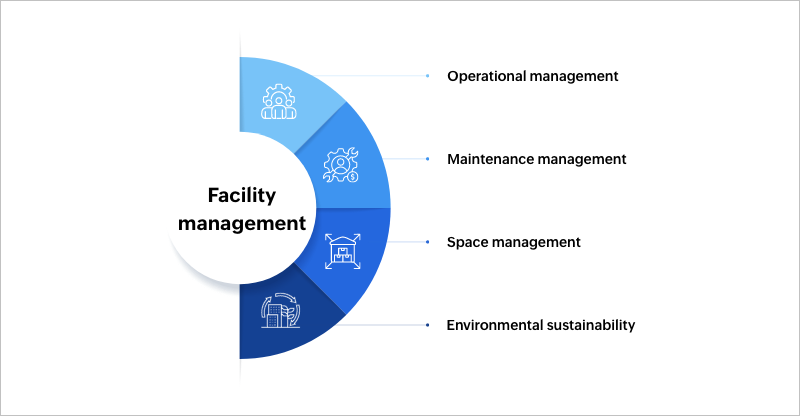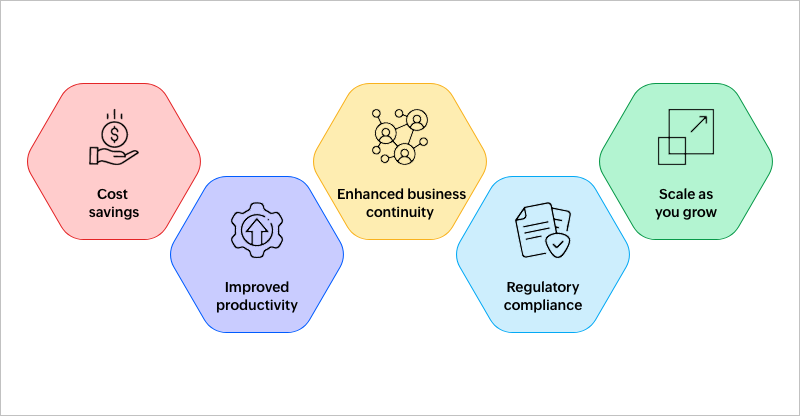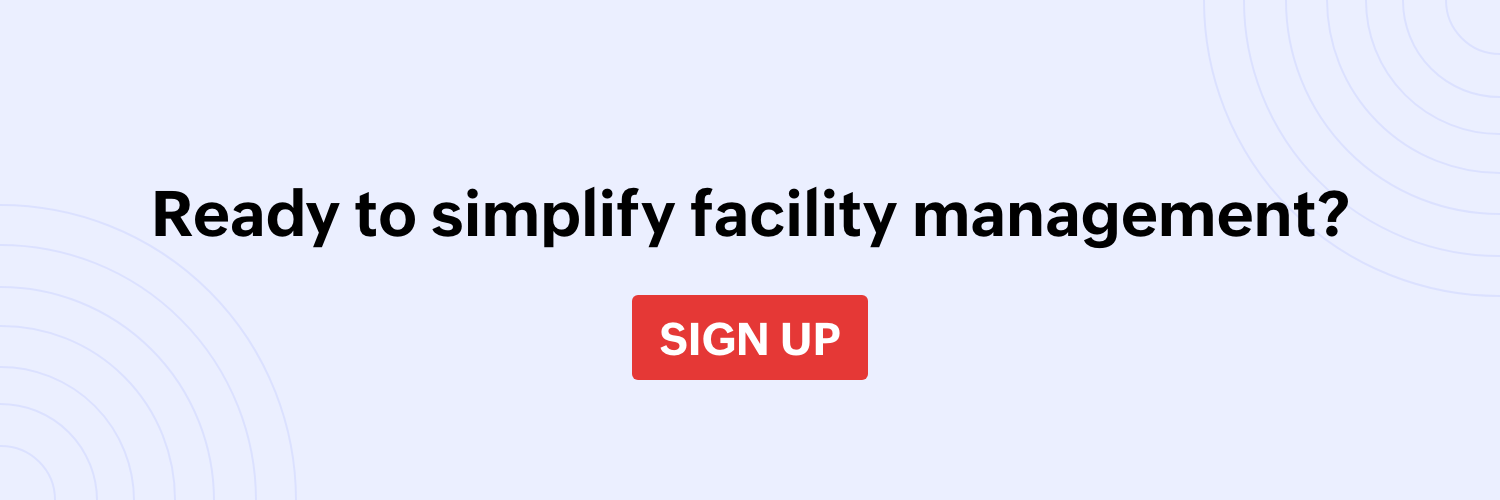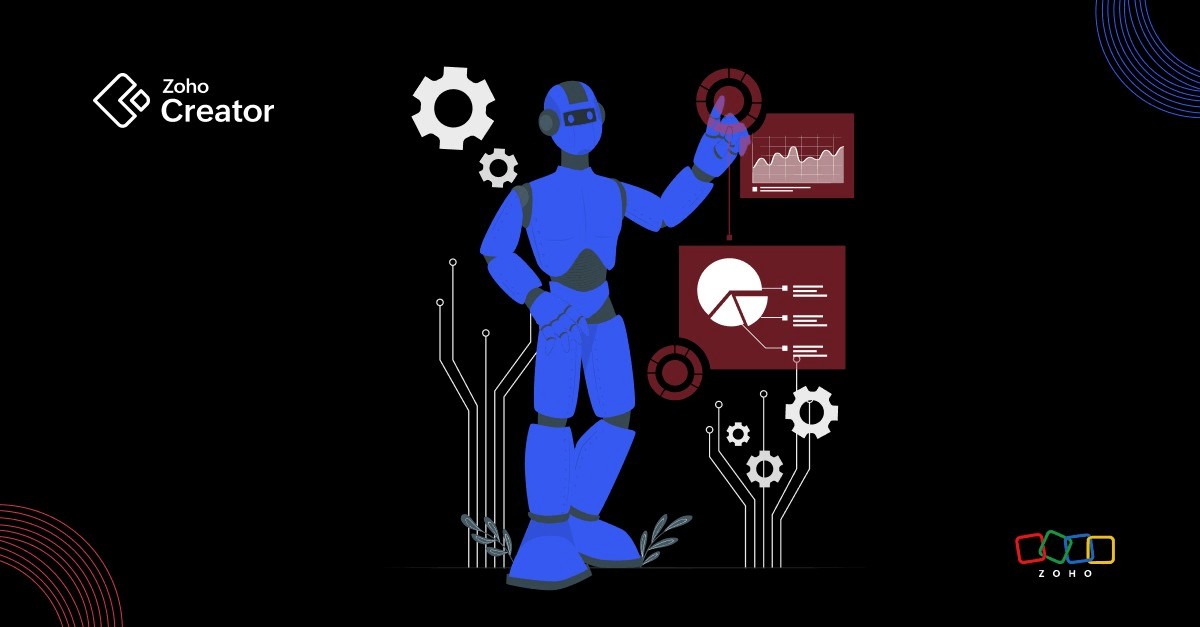- HOME
- Know Your Tech
- Facility management: Why it’s essential for efficient operations
Facility management: Why it’s essential for efficient operations
- Last Updated : November 19, 2025
- 335 Views
- 11 Min Read
Facility management today is no longer just about keeping the lights on; it's about mastering the balance of maintenance, resource management, safety, and adaptability in a constantly changing environment. But staying on top of these responsibilities can quickly become overwhelming for operations and maintenance teams.
The facilities management market is projected to grow from USD 1.315 trillion in 2024 to over USD 2,284.8 billion by 2032, highlighting its increasing importance in driving efficient business operations. However, despite this growth, many companies still face significant losses due to inefficiencies caused by manual processes and disconnected systems.
In this blog post, we'll explore how digitizing and automating facility management can streamline workflows, reduce costs, and help your business thrive in the long term. Whether you're part of an operations or maintenance team, you'll find actionable insights to elevate your facility’s performance.
What is facility management?
Facility management is a broad and essential function that supports the efficiency, safety, and functionality of a business's physical environment. At its core, facility management ensures that all systems, services, and processes within a facility are working in harmony, allowing operations to run smoothly and without interruption.

There are four key aspects of facility management that businesses rely on to keep everything running:
1. Operational management
This involves the day-to-day tasks of keeping a facility in working order, such as maintenance, security, and utilities management. Operational management ensures that the facility’s physical aspects, like HVAC systems, electrical systems, and lighting, are functioning properly.
2. Maintenance management
This focuses on ensuring that assets, equipment, and infrastructure are properly maintained and in good condition. Scheduled maintenance, repairs, and inspections are key activities in this area, helping to reduce downtime and prevent costly breakdowns.
3. Space management
Space management optimizes the use of physical space in the facility. This includes planning for efficient use of office layouts, workstations, meeting rooms, and even storage. A well-planned space leads to better employee productivity and reduced overhead costs.
4. Sustainability and environmental management
As sustainability becomes more important for businesses, this pillar focuses on reducing environmental impact. Managing energy use, water consumption, and waste reduction efforts fall under this category. It’s essential if you're aiming to reduce costs while contributing to a greener environment.
Importance of facility management for businesses: Key benefits

When the key aspects mentioned above are properly aligned, businesses can see substantial improvements in several key areas with these proven benefits:
Cost savings: A well-maintained facility reduces the need for expensive repairs and unexpected downtime. Automating maintenance schedules and switching to a single vendor for cleaning and maintenance can reduce redundancies and lower overall expenses.
Improved productivity: Employees and operations teams can focus on their core tasks when the environment is optimized for comfort, safety, and functionality. This leads to higher efficiency and better outcomes. Facilities management handles essential details such as temperature control and cleanliness, ensuring employees feel appreciated and comfortable in their workplace.
Enhanced business continuity: Proactively addressing potential issues before they escalate helps keep disruptions to a minimum. From malfunctioning HVAC systems to inadequate lighting, regular upkeep ensures everything operates smoothly without unexpected setbacks.
Regulatory compliance: Ensuring your facility stays up to code reduces the risk of legal issues and fines. From conducting fire drills to maintaining fire extinguishers, staying compliant with safety regulations and local laws helps protect your business from hazards and liabilities.
Scale as you grow: As your business expands, your facility management system adapts seamlessly to meet changing demands. Whether adding new locations or adopting new technologies, your management strategy evolves to support growth.
Successful facility management also depends on having a dedicated professional to oversee and coordinate these efforts effectively. This is where the facility manager plays a critical role.
Role of a facility manager
The facility manager is key to executing these best practices effectively. They oversee the daily operations of the building and are responsible for:
Overseeing the daily operations of the building
Coordinating maintenance tasks and schedules
Managing staff and ensuring operational efficiency
Ensuring safety and compliance with regulations
Controlling costs and optimizing resource usage
They're also responsible for managing resources and aligning facility goals with overall business objectives. However, managing these responsibilities manually can be a daunting task, often leading to inefficiencies, missed opportunities, and slower response times.
What are the different types of facility management services?
The services provided under facility management directly support the four core aspects we discussed earlier:
Maintenance
Space management
Sustainability
Operational efficiency
These services ensure that the physical environment is optimized, cost-effective, and aligned with business goals. Here are the essential services that support each element:
Preventive maintenance: Preventive maintenance services ensure that all assets and equipment are regularly inspected and maintained to avoid unexpected breakdowns. This supports the maintenance management pillar by extending the life of equipment and minimizing downtime.
Energy management: Energy management services help monitor and reduce energy consumption, including optimizing HVAC systems, lighting, and other utilities. This ties directly into sustainability and environmental management, promoting energy efficiency while reducing costs and environmental impact.
Cleaning and janitorial services: A clean facility not only promotes employee well-being but also reflects a positive image to clients. This supports the space management pillar by keeping all areas clean and functional, from workstations to meeting rooms.
Security and safety management: Ensuring the safety and security of employees and visitors is a key responsibility. This service overlaps with the operational management pillar, ensuring that security systems are up to date and that safety regulations are met.
Space planning and move management: This has to do with handling spaces' design, layout, and optimization to improve efficiency while managing any office relocations or upgrades.
To make sure your facility is running at its best, adopting efficient and proactive practices is essential.
Best practices for efficient facility management
Facility management isn't just about maintaining systems. It’s about continuously improving processes to reduce waste, optimize performance, and ensure your team stays productive.
Here are some best practices to help streamline your facility management:
Regularly assess and optimize space usage: Maximize your facility’s space by analyzing how it’s being used. Adjust layouts to accommodate team growth, enhance collaboration, or improve workflow. For instance, in offices with hybrid workforces, creating flexible workspaces can increase productivity while reducing wasted space.
Track energy usage and implement energy-saving strategies: Monitoring energy usage helps identify areas where savings can be made. Installing smart thermostats, using energy-efficient lighting, and conducting regular audits of energy consumption can drastically reduce overhead costs while making your facility more sustainable.
Establish clear communication channels: Ensure that all team members, from operations to maintenance staff, can easily communicate about tasks, issues, or updates. Using a centralized platform or app can streamline communication and make it easier to coordinate between teams. This way, you can address issues faster and more efficiently.
Implement predictive maintenance: Move beyond reactive fixes by adopting predictive maintenance tools that use data and analytics to anticipate equipment failures before they occur. This reduces downtime, extends asset life, and lowers repair costs.
Standardize processes and documentation: Create and maintain clear procedures and records for all facility management tasks. Standardization improves accountability, simplifies training, and ensures consistency across teams and shifts.
With so many moving parts, keeping everything organized through traditional methods can stretch your capacity. This is where technology comes in.
Adopting the right technology helps facility managers and businesses simplify these processes, reduce human error, and automate repetitive tasks. By leveraging digital tools, managers can improve communication, track performance in real time, and make quicker, more informed decisions.
How facility management software transforms operations
Facility management involves numerous complex tasks, such as tracking maintenance schedules, managing assets, monitoring utilities, and more. This is why many businesses are turning to facility management software to simplify these processes and make operations more efficient.
What is a facility management software?
Facility management software are digital tools designed to help organizations streamline building operations and manage their facilities more effectively. They centralize critical information, automate routine processes, and provide real-time insights that make decision-making faster and easier.
Instead of juggling multiple spreadsheets, paper records, or disconnected systems, facility managers can use software to monitor everything in one place. This reduces the risk of missed maintenance, improves communication among teams, and helps keep the facility running smoothly.
Take Red Dragon Group, a facilities services company that struggled with managing work orders and tracking assets through manual, paper-based processes. Their teams faced delays because maintenance requests were recorded on paper, making it difficult to track progress or update records in real time. To address these challenges, Red Dragon Group turned to Zoho Creator—a low-code application development platform—to build a custom app to simplify and automate facility management workflows. With Zoho Creator, they were able to:
The result:
|
Key features of facility management software
Facility management software consolidates essential tools to help you stay organized and in control. Here are some of the key features that make this possible:
Work order management
Managing maintenance requests can be overwhelming without a clear system. With a customizable solution like Zoho Creator’s facility management application, you can:
Create, assign, and track work orders from start to finish
Receive automated alerts for pending tasks
Get real-time updates to keep everyone informed
Zoho Creator's flexibility ensures that your facility management processes are streamlined and adapted to your unique needs, making it easier to stay on top of every task.
Asset and inventory management
Tracking assets and inventory is crucial for preventing downtime and planning maintenance. Facility management software allows you to:
Log detailed asset information (purchase date, warranty, service history, etc.)
Schedule preventive maintenance and plan replacements
Maintain visibility into inventory levels to ensure supplies are always available
Utility tracking capabilities
Monitoring energy, water, and other utilities helps identify areas for cost savings and improved sustainability. Facility management software helps you:
Collect and analyze data from various sources
Identify usage trends and generate insightful reports
Make informed decisions to reduce waste and improve efficiency
Space management
Efficient use of space is vital to supporting daily operations. Facility management software enables you to:
Plan and visualize office layouts, meeting rooms, and storage areas
Track workstation usage and reassign unused desks
Improve space utilization and operational efficiency
Vendor management
Managing multiple vendors can be complex, but facility management software simplifies this by allowing you to:
Centralize vendor information (contracts, SLAs, performance)
Monitor deadlines, payments, and service quality
Streamline communication and reduce vendor management complexity
With these powerful features, facility management software simplifies operations, enhances efficiency, and helps ensure that your facility runs smoothly and cost-effectively.
How does facility management software support day-to-day maintenance?
Keeping your facility in top shape means staying ahead of maintenance needs. Facility management software plays a crucial role in simplifying and streamlining these daily maintenance tasks.
Proactive scheduling and preventive maintenance
One of the biggest advantages of facility management software is its ability to support proactive maintenance. It helps you stay ahead with:
Scheduling regular inspections and maintenance tasks based on set time intervals or equipment usage.
Automating reminders so that no preventive maintenance task gets missed.
Identifying small issues early to avoid costly breakdowns later.
Extending the lifespan of assets through consistent upkeep.
Improving overall equipment reliability and reducing unexpected downtime.
Central platform for contract and proposal management
Managing contracts and proposals can often be a complex task involving multiple documents, deadlines, and vendors. An integrated facility management system consolidates all contract information in one centralized platform:
Automated reminders for contract renewals: This ensures you don’t miss important deadlines, helping maintain continuous service without disruptions.
Access to all data in one place: This reduces the risk of errors and helps you maintain strong vendor relationships by ensuring everything is accessible and organized.
Improved visibility and compliance tracking
Integration provides comprehensive oversight of facility operations. By connecting data from various areas, such as maintenance, asset management, and safety inspections, you gain a holistic view of your facility's health:
Automated compliance tracking: Flagging upcoming safety inspections or maintenance tasks helps you prepare in advance, reducing the risk of penalties.
Simplified audits: A unified system makes audits easier and reduces the risk of costly fines by keeping everything organized and on schedule.
Streamlined reporting
Integrated systems gather data from multiple sources and generate detailed reports, offering quick insights into your facility's performance:
Comprehensive reports: For example, you can generate a report that compares maintenance costs with asset performance.
Spotting potential issues early: This helps identify which equipment needs replacement before it fails, saving on costly repairs.
Better resource allocation
Facility management software also provides insights into how resources like budgets, staff, and equipment are being used. For instance:
Utilizing underused equipment: If a piece of machinery is underutilized, you can reassign it to another department or delay purchasing additional equipment. This helps save on costs and improve efficiency.
Enhanced collaboration
When all teams share access to real-time data, communication naturally improves. Here’s how:
Instant coordination: Maintenance and operations staff can quickly coordinate on repair requests via the shared platform, reducing delays and preventing duplicate efforts.
When your facility management systems are connected, it’s easier to manage operations proactively and respond quickly to issues. However, even with the best tools, facility management teams face challenges that can disrupt workflows and affect efficiency.
Challenges and solutions in facility management operations
Facility management is complex, and teams often face hurdles that can slow down operations and impact efficiency. Recognizing these challenges and addressing them with the right solutions is essential to keep your facility running smoothly.
Common challenges and solutions include:
Disorganized workflows
Without a clear system, tasks like maintenance requests and asset tracking can become chaotic, leading to missed deadlines and confusion.
To address this, adopting an integrated solution like Zoho Creator simplifies workflows, tracks work orders, and consolidates asset data, minimizing confusion and preventing overlooked tasks.
Communication gaps
When teams operate in silos or rely on outdated communication methods, important information can get lost or delayed.
Using digital communication tools that provide real-time updates and shared platforms keeps everyone aligned and informed. This approach minimizes delays, enhances coordination, and promotes faster issue resolution.
Manual and paper-based processes
Relying on paperwork slows down operations and increases the risk of errors. Automating these tasks with digital forms and alerts eliminates the need for paper. Automation accelerates task completion, reduces mistakes, and improves record accuracy.
Lack of real-time data
Without up-to-date information, decision-making is often reactive rather than proactive, causing avoidable downtime and expenses.
Real-time monitoring and reporting tools provide live data, enabling teams to spot issues early and make informed decisions quickly. This proactive stance helps maintain continuous operations and control costs.
Compliance complexities
Staying current with safety regulations and audits requires constant attention and accurate documentation.
Automated compliance tracking software monitors regulatory deadlines, schedules inspections, and manages documentation. This simplifies audits, reduces risk, and ensures the facility remains up to code.
By tackling these challenges head-on with the right strategies and tools, facility managers can enhance efficiency, reduce costs, and maintain a safer, more productive environment.
Why facility management is essential
Effective facility management is the backbone of smooth, efficient operations. From proactive maintenance scheduling to streamlined work order tracking and integrated compliance monitoring, modern facility management solutions help businesses save time, cut costs, and improve overall productivity. By centralizing key processes and fostering better communication, facility management software transforms how teams manage daily tasks and long-term planning. It reduces errors, prevents downtime, and boosts operational visibility.
Zoho Creator offers a customizable, cloud-based solution to simplify facility management for businesses of all sizes. With Zoho Creator, you can automate maintenance workflows, track assets in real time, manage contracts, and ensure compliance, all from a single, easy-to-use application. This tailored approach lets you focus on what matters most: running your facility efficiently and effectively.
Ready to take control of your facility management processes? Explore Zoho Creator’s facility maintenance management software today and see how automation can transform your operations.
FAQ
1. What does facilities management do?
Facilities management ensures buildings and infrastructure operate efficiently, focusing on safety, comfort, and productivity for occupants by integrating people, places, and processes.
2. What's the difference between facility management and facility maintenance?
Facility management is the overall strategy coordinating people, processes, and technology for efficient facility operation, while facility maintenance focuses on daily upkeep, repairs, and preventive tasks to keep assets functional.
 Stephen
StephenStephen is a product marketer at Zoho Creator. An avid writer, he plies his trade evangelizing low-code during the day and pens songs at night. Sneakerhead and sushi enthusiast too.




